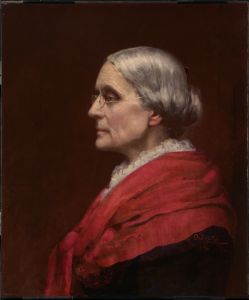
MILWAUKEE, WI - AUGUST 17: In this screenshot from the DNCC’s livestream of the 2020 Democratic National Convention, actress and activist Eva Longoria speaks with athlete Megan Rapinoe during the virtual convention on August 17, 2020. The convention, which was once expected to draw 50,000 people to Milwaukee, Wisconsin, is now taking place virtually due to the coronavirus pandemic. (Photo by Handout/DNCC via Getty Images)
Trump today celebrated the 100th anniversary of the Nineteenth Amendment to the Constitution, protecting women’s right to vote, by announcing that he would pardon suffragist Susan B. Anthony, who was arrested in 1872 for the “crime” of voting. Scholars of suffrage note that Anthony would not want a pardon. “Anthony WANTED to be arrested and convicted and hoped to take her case all the way to the Supreme Court,” wrote historian Marjorie Spruill, “claiming that as a citizen, her right to vote was established by the 14th Amendment. However, because a well wisher paid her fine without consulting her, her case was closed and she was not able to proceed further through the court system. She was furious!”
Deborah L. Hughes, president and CEO of the National Susan B. Anthony Museum & House added that Anthony would oppose a pardon because it would give validity to a case she believed invalid. Hughes told Washington Post reporter Samantha Schmidt that the White House did not consult with the museum before deciding on the pardon.

Susan Brownell Anthony
That oversight might be because highlighting Anthony was designed to please a different audience than scholars and those excited about women’s participation in politics. Anti-abortion forces incorrectly see Anthony as one of their own, and claim her despite a lack of evidence she cared much about the issue at all. After appearing at Tuesday’s event at the White House, Marjorie Dannenfelser, president of the anti-abortion Susan B. Anthony List appeared at Tuesday’s event, then celebrated the “sweet moment,” because Anthony “fought for the rights of all, including the unborn.”
At the suffrage event, reporters asked Trump for his reaction to former First Lady Michelle Obama’s address last night at the Democratic National Convention, a speech widely seen as particularly strong. Trump’s response was a weird self-own that showed the degree to which he focuses exclusively on media and what will make him look best in a particular moment, with no longer strategy. He said, “Well she’s in over her head, and frankly, she should’ve made the speech live, which she didn’t do. She taped it. And it was not only taped, it was taped a long time ago, because she had the wrong deaths….” Trump meant that Mrs. Obama had cited the number of Americans dead from Covid-19 as 150,000, when the number is actually now more than 170,000. Not something one would think he wants to highlight.
Today Postmaster General Louis DeJoy, a Trump loyalist and mega-donor who imposed new rules on the USPS shortly after he took office in June, was forced to announce that he will postpone his overhaul of the USPS until after the election. Americans have been outraged over mail delays and the president’s announcement that his administration’s squeeze on the USPS was designed to hurt the Democrats in November by undercutting mail-in voting. DeJoy is facing Senate hearings on Friday, and House hearings on Monday. Lawmakers will undoubtedly want to hear why the Department of Veterans Affairs has had to go to private companies like FedEx and UPS to get medication to their patients, when previously, the USPS handled about 90% of all VA mail-order prescriptions.
But DeJoy’s statement did not address that, according to an internal USPS planning document obtained by CNN, 95% of the mail sorting machines marked for removal should already be gone.
Today the Senate Intelligence Committee released the fifth and final volume from its investigation of “Russian Active Measure, Campaigns, and Interference in the 2016 U.S. Election.” The bipartisan Senate Intelligence Committee is currently chaired by Republican Marco Rubio (R-FL), although most of the work in the report was done under Republican Richard Burr (R-NC), who stepped down as chair amid allegations of insider trading over information received in a classified briefing over coronavirus. This is a committee run by Republicans.
It concluded that there were extensive connections between Russian operatives and Trump campaign officials in 2016 that “represented a grave counterintelligence threat.” Campaign chair Paul Manafort repeatedly communicated over encrypted channels with Konstantin Kilimnik, his Ukraine business partner who was also, the report establishes, a “Russian intelligence officer.” Manafort shared the campaign’s sensitive polling data with Kilimnik. The report also notes that Manafort consistently lied about his interactions with Kilimnik, and was willing to go to jail rather than tell the truth about them.
The report also established that the White House “significantly hampered” the committee’s investigation and coordinated stories before witnesses talked to the committee, and that there was “significant evidence” that WikiLeaks, which dropped emails hacked from the Democratic National Committee, was “knowingly collaborating with Russian government officials.” Document drops were timed to protect Trump from bad news stories, most obviously the tape of him boasting of sexual assault.
Despite their awareness of this material, Republican Senators refused to hear witnesses at Trump’s impeachment trial, and voted not to convict him.
In any normal year, the big news of the day would have been that today was the second day of the Democratic National Convention, held tonight with actress Tracee Ellis Ross as emcee.
Tonight was the business portion of the convention, and the business at hand was for Democratic delegates to nominate former Vice President Joe Biden for president. First, delegates entered into consideration two candidates: Vermont Senator Bernie Sanders and former Vice President Joe Biden (delegates for the other candidates have been allocated to either Sanders or Biden according to a complicated formula). There was much consternation when progressive Democrat Alexandria Ocasio-Cortez (D-NY) seconded the nomination of Sanders instead of Biden, but only among those who have not dealt with conventions: his delegate count required a nomination and it was an honor to hold a nominating slot. AOC explained with her usual style: “If you were confused, no worries! Convention rules require roll call & nominations for every candidate that passes the delegate threshold. I was asked to 2nd the nom for Sen. Sanders for roll call. I extend my deepest congratulations to [Joe Biden] – let’s go win in November.”
The DNC managed the nomination process virtually in clever videos from each state and territory that served as reminders that the theme of this convention is “We the People.” Delegates stood in front of iconic scenes from their states and told a little of their own history in a process that clipped along much faster than an in-person convention. The virtual trip around the country started in Selma, Alabama with a tribute to the late Representative John Lewis, then traveled around the country until Biden’s home state of Delaware claimed the honor of putting Biden over the top for the nomination at about 10:19 p.m. The new system was so well-received it would surprise me if it doesn’t become the norm.
The theme of the night was leadership. The first item on the list was health care. Progressive activist Ady Barkan, who is grappling with ALS and who first endorsed Massachusetts Senator Elizabeth Warren and then Sanders, recorded a powerful spot for Biden. Then former acting Attorney General Sally Yates, former President Bill Clinton, former Secretary of State John Kerry, and former Chairman of the Joint Chiefs of Staff and former Secretary of State Colin Powell, all endorsed Biden’s foreign policy chops.
The convention also highlighted rising Democratic leaders, and emphasized working across differences to build coalitions. To that end, Arizona Senator John McCain’s widow, Cindy, narrated a video recalling the friendship between Biden and McCain (R-AZ), implying that it was McCain’s friendship for Biden that led to McCain’s historic vote to buck Trump and save the Affordable Care Act.
Once again, though, it was the keynote that anchored the evening. Jill Biden’s earnest recounting of individual stories of community and love were a signal moment in U.S. history. They were a direct contrast to the vignettes of individuals crushed by the government that Ronald Reagan deployed in his famous 1964 speech “A Time for Choosing,” the speech that launched his national political career. Reagan’s vision of the world ushered in a world of toxic individualism; the vision of Dr. Biden, a teacher, offers to reclaim community and social responsibility.
Dr. Biden used the story of her life with Biden, surviving tragedy and rebuilding, as a metaphor for the country. She highlighted the good in Americans, and reminded that “we need leadership worthy of our nation.”
We are pleased to be presenting daily posts from Heather Cox Richardson’s “Letters From an American” email newsletter. You can sign up to receive it in your inbox here.




